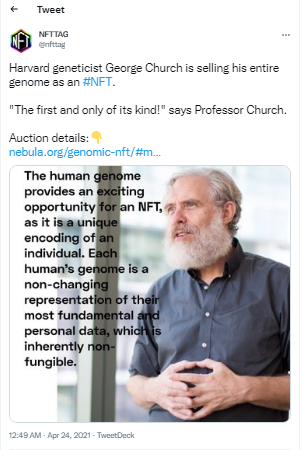Is the practice of auctioning non-fungible tokens (NFT) based on scientific data an interesting art trend, a disaster for the environment, or the future of commercialized genomics?

The strange market for non-fungible tokens (NFTs) is expanding, with anything from visuals to music recordings to all kinds of digital art. Science is also joining the bandwagon for these NFT ownership receipts that are bought and sold online.
The University of California, Berkeley, auctioned off an NFT based on documents linked to Nobel Laureate and cancer researcher James Allison’s work for more than US$50,000 last year. The US Space Force, which is part of the US Armed Forces, began selling a series of NFTs with augmented-reality visuals of satellites and space iconography. Tim Berners-Lee, the inventor of the World Wide Web, is auctioning an NFT with the source code of the initial web browser, as well as a silent video of the code being typed out, from June 23 to June 30 of 2021.
Furthermore, biology pioneer George Church and the San Francisco-based business he co-founded, Nebula Genomics, have announced their desire to sell an NFT of Church’s genome. Church, a Harvard University biologist who helped begin the Human Genome Project, is known for controversial plans such as resurrecting the woolly mammoth and developing a dating app based on DNA.

Figure 1:The University of California, Berkeley is selling an NFT that includes patent disclosures for Jim Allison’s Nobel Prize-winning work. Credit: UC Berkeley
Before the end of March, RMDS Lab, a data and artificial intelligence (AI) platform based in California, wants to l-aunch the world’s first non-fungible token (NFT) marketplace for scientific and technology intellectual property.
However, the rush for NFTs has been praised for enhancing digital art while also being mocked as useless and having a large carbon footprint due to the large computational power necessary to keep it going. Some argue that NFTs in science provide an incentive to exhibit science to the public, as well as a new type of financing and even a mechanism for people to receive royalties when pharmaceutical companies acquire access to their genomic data. Others argue that NFTs, which work in a similar fashion to digital cryptocurrencies, are simply wasting energy in a market bubble that will eventually bust.
Nicholas Weaver, a cryptocurrency researcher at Berkeley’s International Computer Science Institute states that “The more you look at it, the more insane it seems,”
NFTs’ and science ethics
Church and Nebula Genomics released 20 NFTs, each with an image of Church and a special, limited-edition discount on Nebula’s whole-genome sequencing service. An unknown charity, Church, blockchain business Oasis Labs, Nebula Genomics, and the sales platform AkoinNFT will all benefit from the funds donated.
However, that NFT auction was stepped back. After one scientist joked on Twitter: revealing that Church’s genome has long been freely available online, “I’m also selling George Church’s genome, which is a strange coincidence! There will be no auctions, NFTs, or anything.”

This NFT, however, has a more important purpose for Church’s company: it serves as a test run. Nebula Genomics already uses blockchain technology to offer temporary access to their data to select individuals for 15,000 people whose full genomes it has sequenced (such as pharmaceutical companies searching for links between genes and diseases). According to Obbad, NFTs could provide a useful method in the future for customers to profit from those exchanges.
However, some argue that these objectives can be met without the use of NFTs. According to Yaniv Erlich, a computer scientist at Columbia University in New York City and chief science officer of ‘My Heritage’, a genome-sequencing and genealogy firm based in Or Yehuda, Israel, the idea to auction an NFT for Church’s genome “is a Publicity stunt.”
According to bioethicist Vardit Ravitsky of the University of Montreal in Canada, selling personal genomes raises ethical concerns, such as whether someone genuinely owns their genome considering how much of it is shared with family members. She also points out that there are currently discussions about whether people should be able to profit from their biological resources, such as sperm donation. “The next generation of these challenges will be the problem of selling data,” she says.
References
- ‘How scientists are embracing NFTs’ by Nicola Jones Nature news- 18/6/2021
- World’s first NFT marketplace for science and tech IP to launch in March by Rebecca Trager Chemistryworld.com news 13/1/2022
![]()
